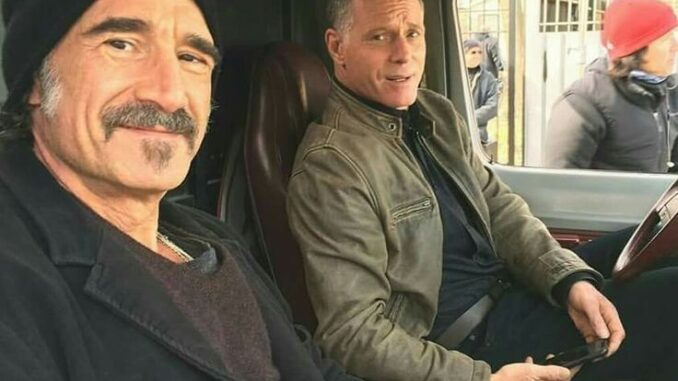
From the very beginning, Alvin Olinsky, played with quiet brilliance by Elias Koteas, stood out. He wasn’t loud or flashy, but his presence grounded the Intelligence Unit. He brought a calm, world-weary wisdom to a team often defined by urgency and chaos. With decades of experience, he operated by instinct, understood the city’s darkest corners, and rarely needed to explain himself. You just knew — when Olinsky stepped in, things were serious.
But his significance went beyond professional competence. At the heart of Olinsky’s character was his deep, unwavering loyalty to Sergeant Hank Voight.
Voight and Olinsky shared a bond that ran deeper than the job. They had history, secrets, scars. While Voight was the fire, Olinsky was the steady force beside him — often cleaning up the mess, often paying the price. Their relationship wasn’t just partnership; it was brotherhood
That’s what made what happened in Season 5 so devastating.

When Voight’s son, Justin, was murdered, it ignited a chain of events that would ultimately cost Olinsky his life. As suspicion fell on Voight for the retaliation killing, the department needed a scapegoat. Olinsky — the loyal soldier who had stood by Voight no matter the consequences — took the fall. He was arrested and placed in jail, isolated and vulnerable.
Then came the unthinkable.
In prison, Olinsky was stabbed by another inmate. By the time Voight reached him, it was too late. The man who had given everything to protect those around him died alone, behind bars — betrayed by a system he had served faithfully for years.
The emotional fallout was immediate and raw.
Voight, usually the epitome of controlled rage, was shattered. In the hospital room where Olinsky lay dying, viewers witnessed a rare moment of vulnerability. There were no dramatic speeches, no promises of revenge — just grief. Just guilt. Just heartbreak.
And it was real.
Jason Beghe delivered one of his most powerful performances as Voight — a man stripped bare by the weight of his own decisions. That scene alone reminded viewers why Chicago P.D. is not just a cop show — it’s a character-driven drama that explores the cost of loyalty, loss, and blurred morality.
Olinsky’s death wasn’t just emotional for viewers. It changed the entire fabric of the show.
Without him, the Intelligence Unit felt colder. Voight grew more ruthless. The balance between justice and vengeance tilted. And perhaps most painfully, the moral compass Olinsky often provided was gone.
In many ways, Olinsky was the last tether holding Voight to a more grounded version of himself. Without that tether, Voight’s descent into moral ambiguity accelerated. He became more isolated, more dangerous — and the unit around him felt the ripple effects.
Off-screen, Elias Koteas’ departure sparked widespread fan reaction. Many were shocked and heartbroken, expressing frustration that such a beloved character would be written out so brutally. Online forums and fan groups filled with tributes, theories, and questions: Why Olinsky? Was it necessary? Couldn’t there have been another way?
But over time, many came to see the storytelling value behind the pain.
Because Chicago P.D. has always been about more than solving crimes. It’s about the human cost of justice — the emotional toll on those who enforce it, and the consequences of every decision made in pursuit of it. Olinsky’s death wasn’t just shocking; it was a reflection of everything the show stands for. Actions have consequences. Even heroes fall.
And fall he did — not in a blaze of glory, but quietly, painfully, tragically.
Even years later, his absence is felt. In Voight’s silence. In the way the team operates. In the unspoken grief that occasionally resurfaces.
Alvin Olinsky wasn’t the flashiest character. He didn’t always get the biggest scenes or the loudest lines. But he was the soul of Chicago P.D. — and his loss was the moment that reminded us all why this show hits deeper than most.
